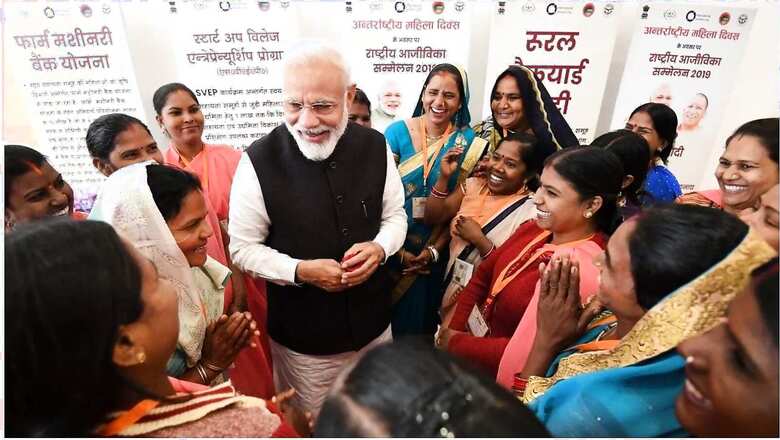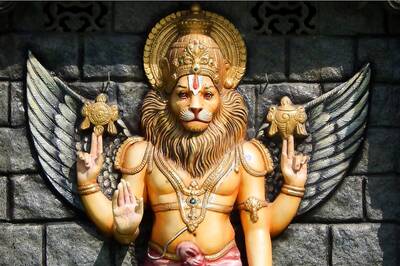
views
The country is celebrating the 195th birth anniversary of the social reformer Mahatma Jyotiba Phule. Among other things, he pioneered the movement for educating girls and emancipating women of underprivileged castes. While remembering his legacy, this occasion also provides an opportunity to review the phenomenal changes that have transpired in this area over the last few years.
At a very young age, Mahatma Phule started his first girls’ school in Pune, Maharashtra, which was the first step in a long list of seminal interventions for the cause of empowerment of women. Phule’s lifelong mission was based on the belief that education was fundamental to the welfare of the downtrodden as it was an asset that couldn’t be taken away from them on the whims and fancies of the power elite of that time.
The journey and achievements of Narendra Modi as a socio-political thinker and as an administrator reminds observers of the success of Mahatma Phule’s activism. They are both rooted in the understanding that true and sustainable empowerment can be brought about only if marginalised women and the disadvantaged sections of society have the access to the same tools as their peers from other sections of the society.
Also Read: PM Modi is Tearing Down Age-Old Barriers Restricting Women Empowerment
However, government schemes for women can only achieve limited success unless a society acknowledges the prevalent bias and is inspired to correct it. This is precisely what PM Modi sought to achieve when he launched the Beti Bachao, Beti Padhao movement.
The movement brought about a behavioural change in the society that has helped improve the sex ratio of the population from 991 in 2015-16 to 1020 in 2019-21, per 1,000 males. Further, the gross enrolment ratio of girls across various levels has already achieved parity.
Along with the social movement, the government has launched specifically tailored schemes to free women from the clutches of underdevelopment and neglect of the past. The Pradhan Mantri Awaas Yojana – Gramin, for example, has earmarked 60% of the total houses for Scheduled Castes and Scheduled Tribes communities. Out of the 2 crore houses sanctioned, this would amount to roughly 1.3 crore pucca houses for people who are poor as well as socially disadvantaged. Moreover, the scheme has a stated preference for making women owners of houses – this has meant that almost 70% of these houses have women and sole or joint owners. Consider the intersection in the profile of the typical beneficiary here – poor, socially disadvantaged and female. This is a tremendous boost of dignity and self-reliance for such a demographic.
The transformative impact of the scheme on marginalised women can’t be overstated. First, after seventy-odd years of Independence, the poor are now reaping the rewards of a caring government determined to make their lives better. Second, it has turned countless SC/ST women into ‘lakhpatis’ due to ownership of houses, many of whom may have never owned an asset before. The spin-off effects of the scheme will certainly be visible in the enhanced social status of these women who feel more confident about taking on new challenges.
Half of the 34 crore beneficiaries of the immensely successful and empowering Prime Minister MUDRA Yojana (PMMY) — which provides collateral-free loans of up to Rs 10 lakh for small businesses – belong to the SC/ST/OBC communities. And many of them are women because women are anyway 70% of MUDRA Yojana’s beneficiaries. Similarly, a massive amount of Rs 30,160 crore has been provided to SC/ST and women under the Stand Up India scheme that funds entrepreneurs. The entrepreneurs can avail of loans between Rs 10 lakh to Rs 1 crore under the scheme.
The pattern is clear – women, who are the most disadvantaged even among the marginalised communities, are benefiting immensely.
PM Modi’s doctrine of governance is rooted in freeing women from the many indignities that lack of development had inflicted on their daily lives. The freedom from such structural shackles makes their true potential come to the fore. Mahatma Phule used education as a tool to achieve the same goal. It wouldn’t be an exaggeration to say that Phule would have wholeheartedly endorsed PM Modi’s transformative schemes and the underlying philosophy.
Since 2014, the government has created a welfare architecture that is aimed at eliminating the daily drudgery of women’s lives, a large section of whom belong to the SC/ST/OBC communities.
While the schemes launched by PM Modi and their singular success are part of the mainstream stories, what’s often not well known is that Narendra Modi’s governance philosophy on women empowerment was the same even as the Chief Minister of Gujarat.
The then Chief Minister Modi had raised Rs 89.96 crore by auctioning all gifts he received and donated this to the Kanya Kelavani Fund, which was devoted to increasing the enrolment of girls in schools.
As he bid farewell to Gujarat to take over as the Prime Minister of India, Narendra Modi had also donated Rs 21 lakh from his personal savings towards the upbringing and welfare of the daughters of drivers and peons employed with the state government.
Sunita Duggal is a former IRS officer and current Lok Sabha member from Sirsa, Haryana. The views expressed in this article are those of the author and do not represent the stand of this publication.
Read all the Latest Opinion News and Breaking News here

















Comments
0 comment